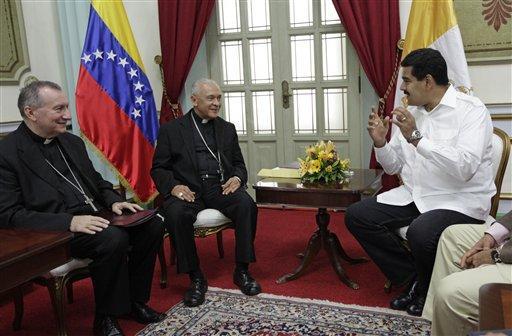The New York Times published a well-crafted, grammatically impeccable article written by Venezuelan President Nicolás Maduro, in which he painted the country in a very optimistic and unrealistic light.
Spewing manipulated facts and empty words about dialogue and “calls for peace,” Maduro pled to the American people to contact their representatives in Congress to strike down prospective U.S. sanctions that could be hitting the Venezuelan government.
I can say with full certainty that Maduro is lying to the American people.
In his letter, Maduro cites the United Nations, saying Venezuela has continued to reduce income inequality since former President Hugo Chávez went into power.
The problem is the Venezuelan government caused this reduction by spending more money rather than diversifying the economy, and this is not a sustainable solution in the long run because no government can afford to run on deficit for long periods of time.
Maduro then mentioned a World Bank statistic about the declining poverty levels in the country.
While it’s true that the Venezuelan government has made progress in the poverty levels of the country, it is important for the public to realize that local government institutions provide the information for statistics used by international organizations, such as the World Bank.
The local Venezuelan government manipulates these statistics to paint Maduro and his crew in a more favorable light.
Take the country’s unemployment rate. Venezuela’s National Institute of Statistics reported that unemployment in the country, which was at an all-time high in 2003 at 20.7 percent, is currently 7.4 percent. However, Venezuela’s statistics consider that a person who works one week each month is counted as employed, as well as people who work in the informal economy, such as street vendors.
Maduro then praises the Venezuelan people by talking about the increase in political participation, and he compliments his party by reminding the reader of the “Chavista” movement’s high number in election wins.
He really makes a statement when he quotes former U.S. President Jimmy Carter, saying Venezuela has the best electoral system of all.
However, elections aren’t the sole component of democracy.
While presidents like Maduro and Chávez proclaim their benevolence toward all parts of the country on network television, the government is gerrymandering the Venezuelan congress’ voter distribution so states with a predominantly pro-opposition population have less of a voice in the National Assembly.
If opposite viewpoints are subtly taken out of a republic’s equation, how can we say that a country is democratic?
This Venezuelan government has done a lot for the country’s lower-income families, and it has tried to satisfy every pre-requisite to a stable and educated Venezuelan life, but they aren’t doing it the right way.
Yes, the government made more free education programs and increased the university attendance, but free education programs have been available in Venezuela since the middle of the 20th century.
It is also significant to note that attendance is up in higher education because the government created small universities where medical students become doctors in three years, and engineers graduate without ever taking a math or physics course.
The numbers are up in work force and mediocrity.
These are just a few of the many dolled-up lies that Maduro’s government fed to the American people and the international community in his New York Times article.
The protests that are currently halting the country are asking the government to step down so more capable people can take the reins, but they aren’t expecting to achieve their goal in a violent manner.
Yes, it’s great when Maduro tells a newspaper he’s open for dialogue, but when teenage students are tortured in government prisons and peaceful protests are stopped with real ammunition instead of anti-riot equipment, how is a person who opposes the government supposed to feel safe about speaking up?
It’s important that the American people are well-informed on all aspects of Venezuelan policy if Maduro truly expects them to give a well-rounded opinion to their public representatives.
With this letter, Maduro doesn’t do that.
I agree 100 percent with the idea that the protests have to stop. But the way to stop a passionate Venezuelan from yelling about their beliefs isn’t by shooting them down or taping their mouths shut, but by listening.
The minute Maduro truly listens to what the other 50 percent of his nation has to say, the protests will stop and negotiations can push the country forward.
Jose Bastidas is a 21-year-old mass communication junior from The Woodlands, Texas.
Opinion: No, Maduro’s column aimed to manipulate Americans.
April 7, 2014

CORRECTS POSITION OF TWO MEN AT LEFT – FILE – In this June 14, 2013 file photo, Venezuela’s President Nicolas Maduro, right, meets with Venezuela’s Archbishop Diego Rafael Padron Sanchez, center, and Italian Pietro Parolin, Holy See’s representative in Venezuela, at Miraflores presidential palace in Caracas, Venezuela. Padron, speaking in Caracas on Wednesday, April 2, 2014, accused Maduro of attempting to criminalize dissent. Venezuela’s organization of Catholic bishops is accusing the government of seeking totalitarian-style rule, comments that potentially could complicate the Vatican’s offer to facilitate talks between the socialist government and its opposition. (AP Photo/Ariana Cubillos, File)




